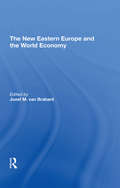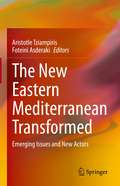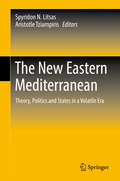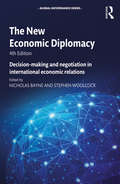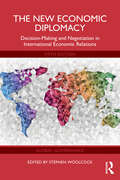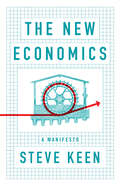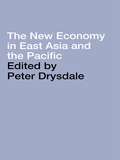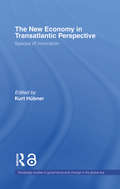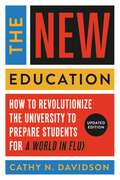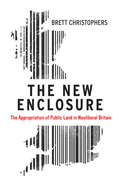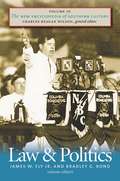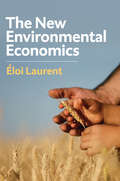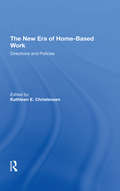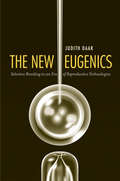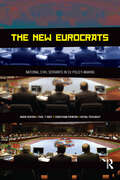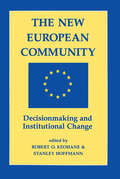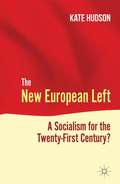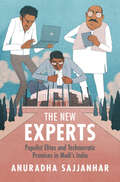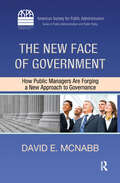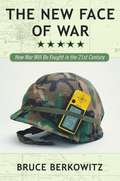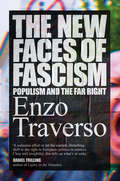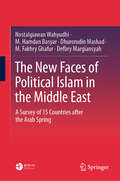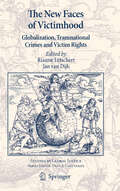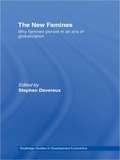- Table View
- List View
The New Eastern Europe And The World Economy
by Jozef M. Van BrabantThe unprecedented economic, political, and social changes that have followed the east European revolutions of late 1989 rank among the epochal events of the twentieth century. The end of the cold war has opened up far-reaching possibilities for international economic cooperation, which may be able to stimulate economic growth in the region and revive interactions with the global economy. This collection of essays comes to grips with the problems of repositioning the new Eastern economies in the global arena. The contributors address four main themes: freeing up foreign economic sectors through trade liberalization, currency convertibility, and greater access to markets for international capital; the disintegration of the trade payment, pricing, and settlements systems based on the transferable ruble; active participation in the key organizations entrusted with international financial, monetary, and trading regimes; and strategies for using international economic assistance to alleviate adjustment costs with ongoing transition policies
The New Eastern Mediterranean Transformed: Emerging Issues and New Actors
by Aristotle Tziampiris Foteini AsderakiThis collective volume examines the evolving political dynamics of the Eastern Mediterranean. Recently, both the opportunities, such as the energy resources, and the challenges, such as the enormous migration flows, have caught the international attention since they have redefined the balance of powers in the area. This volume assembles the analyses of acknowledged scholars and academics from the Eastmed countries, who assess the most fundamental developments of the region in a comprehensive manner, underscoring the significance of the Eastern Mediterranean for the world politics. The book focuses on readers and parties primarily at European level/ EU affiliated, interested in national, regional, EU or international aspects of the Eastern Mediterranean area, such as politics, security, migration governance and energy developments on regional and EU level.
The New Eastern Mediterranean: Theory, Politics and States in a Volatile Era (The International Political Economy of New Regionalisms Series)
by Aristotle Tziampiris Spyridon N. LitsasThis volume provides an introduction to the Eastern Mediterranean region and introduces the concept of the Eastern Mediterranean as a new regional subsystem. Due to recent events in contemporary international politics, the Eastern Mediterranean can be seen as a laboratory where the balance of power among Great Powers and regional states are being tested. Written by leading academics in their respective fields, this book addresses key developments in the area and argues that the Eastern Mediterranean should be viewed as a distinct region. Particular emphasis is given to the initiatives undertaken by Israel, Greece, Cyprus, and Turkey; the role played by the United States and Russia; and the issues of energy, migration, and Islamic terrorism. Bringing together relevant information and theoretical debates, this book will be of interest to graduate students and academics studying international relations and politics in the Eastern Mediterranean, as well as policymakers and journalists who want to have a clearer understanding of developments in the region.
The New Economic Diplomacy: Decision-Making and Negotiation in International Economic Relations (Global Governance)
by Nicholas Bayne Stephen WoolcockThe New Economic Diplomacy explains how states conduct their external economic relations in the 21st century: how they make decisions domestically, how they negotiate internationally and how these processes interact. Although the previous edition, published in 2011, was able to reflect the impact of the financial crisis and the immediate reaction to it, a lot has happened since then, and the atmosphere of economic diplomacy has darkened. To capture the emergence of new trends and the intensification of old ones, the salient features of this new edition are: The advance of China and other emerging powers at the expense of G7 governments, despite some setbacks; Much greater activity in negotiating regional and plurilateral trade agreements, while the multilateral system struggles; The persistence of problems exposed by the financial crisis, notably the long-running euro-zone crisis. The interaction between domestic and external forces: the balance has shifted towards the domestic axis, with international agreement more difficult to achieve. This edition goes further in comparing the practice of different players, to reflect the greater diversity of economic diplomacy. Based on the authors' work in the field of International Political Economy, it is suitable for students interested in the decision-making processes in foreign economic policy, including those studying international relations, government, politics and economics. It will also appeal to politicians, bureaucrats, business people, NGO activists, journalists and the informed public.
The New Economic Diplomacy: Decision-Making and Negotiation in International Economic Relations (Global Governance)
by Stephen WoolcockThe New Economic Diplomacy, fifth edition, explores how states conduct their external economic relations, make domestic decisions, negotiate internationally and how these processes interact. It provides the reader with an understanding of – and the means with which to analyse – the processes of decision-making and negotiation in international economic relations and clarifies our understanding of ‘economic diplomacy’ and how it can be understood as consisting of ‘commercial diplomacy’, ‘negotiating international cooperation’, ‘economic statecraft’ and ‘economic sanctions’.To capture the emergence of new trends and the intensification of old ones, this new edition focuses on: Responses to geopolitics in economic diplomacy The intensification of domestic pressures on decision-making in international economic relations The weakening of multilateralism and emergence of a multipolar system The continued importance of policy processes in responding to these challenges and Case studies to illustrate how this economic diplomacy is affected by different domestic and international settings This book will be of interest to scholars and students of the decision-making processes in foreign economic policy, including those studying international relations, government, politics and economics. It will also appeal to practitioners, those working in NGOs and others wishing to understand how decisions are taken and negotiations conducted.
The New Economics: A Manifesto
by Steve KeenIn 1517, Martin Luther nailed his 95 theses to the wall of Wittenberg church. He argued that the Church’s internally consistent but absurd doctrines had pickled into a dogmatic structure of untruth. It was time for a Reformation. Half a millennium later, Steve Keen argues that economics needs its own Reformation. In Debunking Economics, he eviscerated an intellectual church – neoclassical economics – that systematically ignores its own empirical untruths and logical fallacies, and yet is still mysteriously worshipped by its scholarly high priests. In this book, he presents his Reformation: a New Economics, which tackles serious issues that today's economic priesthood ignores, such as money, energy and ecological sustainability. It gives us hope that we can save our economies from collapse and the planet from ecological catastrophe. Performing this task with his usual panache and wit, Steve Keen’s new book is unmissable to anyone who has noticed that the economics Emperor is naked and would like him to put on some clothes.
The New Economy in East Asia and the Pacific (PAFTAD (Pacific Trade and Development Conference Series) #10)
by Peter DrysdaleThis book sets out the problems of measuring the effects of technological change on economic progress by using the internet in the Asia-Pacific region as a case study. Corporate and industry experience, including changing business organization and new regulatory issues are explored as well as policy issues such as the digital divide and the approach to e-commerce in the WTO. Using several industry case studies the contributors compare the IT experience in North America with a number of countries in Asia and the Pacific.
The New Economy in Transatlantic Perspective (Routledge Studies in Governance and Change in the Global Era)
by Kurt HübnerWhat’s left from the new economy? This book takes an unfashionable perspective and shows that despite all the mistaken ideas and exaggerations, the technological changes of the 1990s still have important effects today. Economic history shows that technological revolutions tend to generate deep economic and social crises before a temporary state of equilibrium is reached. The established modes of accumulations and regimes of regulation of national capitalisms and international capitalism have been undermined by the collapse of the high tech asset bubble. Financial markets are still in disarray. What can be observed, however, is that national economies are better positioned to tackle the crisis than others. Why is this? This and other important questions are tackled by an international team of contributors including Daniele Archibugi, Harald Hagemann, Bruno Amable, Martin Heidenreich and David Gibbs. This volume should be of great interest to all those working at the intersection of international politics and economics.
The New Education: How to Revolutionize the University to Prepare Students for a World In Flux
by Cathy N. DavidsonA leading educational thinker argues that the American university is stuck in the past--and shows how we can revolutionize it for our era of constant changeOur current system of higher education dates to the period from 1865 to 1925, when the nation's new universities created grades and departments, majors and minors, in an attempt to prepare young people for a world transformed by the telegraph and the Model T. As Cathy N. Davidson argues in The New Education, this approach to education is wholly unsuited to the era of the gig economy. From the Ivy League to community colleges, she introduces us to innovators who are remaking college for our own time by emphasizing student-centered learning that values creativity in the face of change above all. The New Education ultimately shows how we can teach students not only to survive but to thrive amid the challenges to come.
The New Enclosure: The Appropriation of Public Land in Neoliberal Britain
by Brett ChristophersHow public land has been stolen from us.Much has been written about Britain's trailblazing post-1970s privatization program, but the biggest privatization of them all has until now escaped scrutiny: the privatization of land. Since Margaret Thatcher took power in 1979, and hidden from the public eye, about 10 per cent of the entire British land mass, including some of its most valuable real estate, has passed from public to private hands. Forest land, defence land, health service land and above all else local authority land- for farming and school sports, for recreation and housing - has been sold off en masse. Why? How? And with what social, economic and political consequences? The New Enclosure provides the first ever study of this profoundly significant phenomenon, situating it as a centrepiece of neoliberalism in Britain and as a successor programme to the original eighteenth-century enclosures. With more public land still slated for disposal, the book identifies the stakes and asks what, if anything, can and should be done.
The New Encyclopedia of Southern Culture: Law and Politics
by James W. Ely Bradley G. BondVolume 10 of The New Encyclopedia of Southern Culture combines two of the sections from the original edition, adding extensive updates and 53 entirely new articles. In the law section of this volume, 16 longer essays address broad concepts ranging from law schools to family law, from labor relations to school prayer. The 43 topical entries focus on specific legal cases and individuals, including historical legal professionals, parties from landmark cases, and even the fictional character Atticus Finch, highlighting the roles these individuals have played in shaping the identity of the region. The politics section includes 34 essays on matters such as Reconstruction, social class and politics, and immigration policy. New essays reflect the changing nature of southern politics, away from the one-party system long known as the "solid South" to the lively two-party politics now in play in the region. Seventy shorter topical entries cover individual politicians, political thinkers, and activists who have made significant contributions to the shaping of southern politics.
The New Environmental Economics: Sustainability and Justice
by Eloi LaurentToo often, economics disassociates humans from nature, the economy from the biosphere that contains it, and sustainability from fairness. When economists do engage with environmental issues, they typically reduce their analysis to a science of efficiency that leaves aside issues of distributional analysis and justice. The aim of this lucid textbook is to provide a framework that prioritizes human well-being within the limits of the biosphere, and to rethink economic analysis and policy in the light of not just efficiency but equity. Leading economist Éloi Laurent systematically ties together sustainability and justice issues in covering a wide range of topics, from biodiversity and ecosystems, energy and climate change, environmental health and environmental justice, to new indicators of well-being and sustainability beyond GDP and growth, social-ecological transition, and sustainable urban systems. This book equips readers with ideas and tools from various disciplines alongside economics, such as history, political science, and philosophy, and invites them to apply those insights in order to understand and eventually tackle pressing twenty-first-century challenges. It will be an invaluable resource for students of environmental economics and policy, and sustainable development.
The New Era Of Home-based Work: Directions And Policies
by Kathleen ChristensenThis book focuses on the causes and consequences of paid white-collar work in the home, including work that is professional, managerial, clerical, technical, and sales. It is directed to audiences concerned with both the policy issues and the research challenges reused by working at home.
The New Eugenics: Selective Breeding in an Era of Reproductive Technologies
by Prof. Judith DaarA provocative examination of how unequal access to reproductive technology replays the sins of the eugenics movement Eugenics, the effort to improve the human species by inhibiting reproduction of "inferior" genetic strains, ultimately came to be regarded as the great shame of the Progressive movement. Judith Daar, a prominent expert on the intersection of law and medicine, argues that current attitudes toward the potential users of modern assisted reproductive technologies threaten to replicate eugenics' same discriminatory practices. In this book, Daar asserts how barriers that block certain people's access to reproductive technologies are often founded on biases rooted in notions of class, race, and marital status. As a result, poor, minority, unmarried, disabled, and LGBT individuals are denied technologies available to well-off nonminority heterosexual applicants. An original argument on a highly emotional and important issue, this work offers a surprising departure from more familiar arguments on the issue as it warns physicians, government agencies, and the general public against repeating the mistakes of the past.
The New Eurocrats: National Civil Servants in EU Policymaking
by Sebastiaan Princen Paul Hart Kutsal Yesilkagit Karin GeuijenPolicies in the EU are largely made by national civil servants who prepare and implement decisions in Brussels as well as at home. Despite their important role, these national civil servants form a relatively hidden world that has received little attention from both the media and academics. This volume considers a wide variety of sources and research methods to answer such questions as: how many civil servants are actually involved in EU-related activities? What do these civil servants do when they engage with the EU? And how do they negotiate their dual roles? The New Eurocrats offers unique and invaluable insights into these civil servants and their working practices—and uncovers some secrets in the world of EU governance along the way.
The New European Community: Decisionmaking And Institutional Change
by Robert O KeohaneThe New European Community is the first systematic, book-length discussion of the major political institutions of the European Community (EC) after the transformation of the 1987 Single European Act, itself a surprise and a mystery whose effects are unraveled here.Professors Keohane and Hoffmann open the volume by placing the evolution of the new European Community into broad, theoretical perspective. Their expert contributors?including highly regarded international scholars, a judge of the European Court of Justice, and a long-term British politician?present engaging overviews of the process at work in major EC events and institutions. The centerpiece of the volume, Peter Ludlow's chapter on the European Commission, lays out all of the systems and actors in the emerging EC and shows their direct connection with problems of Community development and integration.Filled with examples, illustrations, anecdotes, and valuable data, The New European Community will be indispensable for all students and scholars of international relations and European studies as well as for those in business and government who want to understand the European Community before and beyond 1992.
The New European Left
by Kate HudsonHudson explores the development of communists and other left forces, charting their survival and renewal after 1989. She shows how an open and democratic form of socialism has emerged which embraces environmental, gender and anti-war politics.
The New Experts: Populist Elites and Technocratic Promises in Modi's India
by Anuradha SajjanharIf right-populists have had enough of establishment experts, how do they replace them, with whom, and to what effect? Presenting the first in-depth analysis of India's new intellectual elite in the wake of a Hindu supremacist government, The New Experts investigates the power of appointed experts in normalising ideologies of governance, beyond party rhetoric. The New Experts presents an accessible narrative of how and why particular ideas gain prominence in elite policy and political discourse. Drawing on in-depth interviews and ethnographic research with national and international policy makers, politicians, bureaucrats, consultants, and journalists, this book analyses how political leaders in India strategically use modes of populist spectacle and established technocratic institutions to produce shared visions of glorified technological and hyper-nationalist futures. This title is part of the Flip it Open Programme and may also be available open access. Check our website Cambridge Core for details.
The New Extremism in 21st Century Britain (Extremism and Democracy)
by Roger Eatwell Matthew J. GoodwinSince the 1990s, there has been a growing concern about the resurgence of extremist and radical movements in the Western world. Although a variety of challenges to the liberal democratic order have emerged, the main focus of concern among academics, policy-makers and practitioners within Europe and beyond has been on the growth and activities of Islamists and to a lesser extent the extreme right. However, these forms of extremism are seldom placed alongside each other, and in a manner that is sensitive to both the causes and consequences of extremist mobilization. This book presents new empirical research on the causes of these two ‘new’ extremisms in 21st Century Britain and the appropriate responses to it by both the state and civil society. Both forms of extremism pose vital questions for those concerned with the development of a more cohesive and stable society. Unlike many studies, this volume adopts a holistic approach, bringing together experts from a variety of disciplines to examine the factors that cause support and the potential policy responses, including key questions such as: What is the current level of support for Islamism and right-wing extremism? Who votes for extreme right parties such as the BNP in modern Britain and, despite its recent gains, why has the extreme right achieved only limited success? What are the steps of recruitment into radical violent takfiri jihadism? How effective are current responses to Islamism and the extreme right, such as those offered by Preventing Violent Extremism (PVE), wider public policy and policing? What is the potential role of political actors, media and civil society in responding to the extremist challenge? Challenging broad assumptions and bringing together leading scholars in this rapidly developing field, this work is essential reading for all those with an interest in terrorism, fascism, political extremism, social cohesion and the future of race relations.
The New Face of Government: How Public Managers Are Forging a New Approach to Governance (ASPA Series in Public Administration and Public Policy #No. 154)
by David E. McNabbChange is sweeping the globe, and at the government level, operational changes are prompting many public administrators to develop new management styles and ways of delivering services to their citizens. In the process, they are changing the face of government. The New Face of Government: How Public Managers are Forging a New Approach to Governance explores how national leaders are changing the art and practice of government and how public managers are shaping and guiding government’s response to the transformation. Includes a Field-Tested Survey for Diagnosing Institutional Disequilibrium Focusing on change at the federal, state, and local levels, this book addresses policy dimensions such as: Strategic and knowledge management Enterprise architecture Information and communications technology Organizational performance assessment Technological and organizational improvement It evaluates how these areas enable agencies from the public and private sectors to become more cost-effective, performance-oriented learning organizations. Not all the ambiguities in policy making and administration have been resolved. However, there is much hope for the future of government and governance. The successes and failures included in The New Face of Government: How Public Managers are Forging a New Approach to Governance illustrate this promise and provide guideposts for public managers who find themselves faced with similar problems and new challenges. About the Author: David E. McNabb teaches a variety of public and private administration and management courses both in the U.S. and abroad, including college and university programs in Latvia, Bulgaria, Germany, the United Kingdom, Italy, France, and Belgium. He is the author of nearly 80 peer-reviewed conference papers and articles. This is his seventh book.
The New Face of War: How War Will Be Fought in the 21st Century
by Bruce D. BerkowitzAs American and coalition troops fight the first battles of this new century -- from Afghanistan to Yemen to the Philippines to Iraq -- they do so in ways never before seen. Until recently, information war was but one piece of a puzzle, more than a sideshow in war but far less than the sum total of the game. Today, however, we find information war revolutionizing combat, from top to bottom. Gone are the advantages of fortified positions -- nothing is impregnable any longer. Gone is the reason to create an overwhelming mass of troops -- now, troop concentrations merely present easier targets. Instead, stealth, swarming, and "zapping" (precision strikes on individuals or equipment) are the order of the day, based on superior information and lightning-fast decision-making. In many ways, modern warfare is information warfare. Bruce Berkowitz's explanation of how information war revolutionized combat and what it means for our soldiers could not be better timed. As Western forces wage war against terrorists and their supporters, in actions large and small, on several continents, The New Face of War explains how they fight and how they will win or lose. There are four key dynamics to the new warfare: asymmetric threats, in which even the strongest armies may suffer from at least one Achilles' heel; information-technology competition, in which advantages in computers and communications are crucial; the race of decision cycles, in which the first opponent to process and react to information effectively is almost certain to win; and network organization, in which fluid arrays of combat forces can spontaneously organize in multiple ways to fight any given opponent at any time. America's use of networked, elite ground forces, in combination with precision-guided bombing from manned and unmanned flyers, turned Afghanistan from a Soviet graveyard into a lopsided field of American victory. Yet we are not invulnerable, and the same technology that we used in Kuwait in 1991 is now available to anyone with a credit card and access to the Internet. Al Qaeda is adept in the new model of war, and has searched long and hard for weaknesses in our defenses. Will we be able to stay ahead of its thinking? In Iraq, Saddam's army is in no position to defeat its enemies -- but could it defend Baghdad? As the world anxiously considers these and other questions of modern war, Bruce Berkowitz offers many answers and a framework for understanding combat that will never again resemble the days of massive marches on fortress-like positions. The New Face of War is a crucial guidebook for reading the headlines from across our troubled planet.
The New Faces of Fascism: Populism and the Far Right
by Enzo TraversoWhat is fascism in the twenty first century?What does Fascism mean at the beginning of the twenty-first century? When we pronounce this word, our memory goes back to the years between the two world wars and envisions a dark landscape of violence, dictatorships, and genocide. These images spontaneously surface in the face of the rise of radical right, racism, xenophobia, islamophobia and terrorism, the last of which is often depicted as a form of "Islamic fascism." Beyond some superficial analogies, however, all these contemporary tendencies reveal many differences from historical fascism, probably greater than their affinities. Paradoxically, the fear of terrorism nourishes the populist and racist rights, with Marine Le Pen in France or Donald Trump in the US claiming to be the most effective ramparts against "Jihadist fascism". But since fascism was a product of imperialism, can we define as fascist a terrorist movement whose main target is Western domination? Disentangling these contradictory threads, Enzo Traverso's historical gaze helps to decipher the enigmas of the present. He suggests the concept of post-fascism--a hybrid phenomenon, neither the reproduction of old fascism nor something completely different--to define a set of heterogeneous and transitional movements, suspended between an accomplished past still haunting our memories and an unknown future.
The New Faces of Political Islam in the Middle East: A Survey of 15 Countries after the Arab Spring
by Nostalgiawan Wahyudhi M. Hamdan Basyar Dhurorudin Mashad M. Fakhry Ghafur Defbry MargiansyahThis book provides a survey of the political situation in 15 Arab countries in the Middle East and North Africa and provides overviews of associated post-Arab Spring politics, with an emphasis of political Islamist movements. A translation from its original in Bahasa Indonesia, the book critically assesses the concept of post-Islamism from an Indonesian perspective. It argues that the wave of democratization in the Middle East following the Arab Spring failed to create an open democratic life in the region, except in the country where the Arab Spring began, Tunisia. Rather, it has left growing conflicts and destabilization in the region, with the rise of new authoritarianism. The authors simultaneously show that Islamic political movements in general are adaptive in the face of the changing political environment post-Arab Spring. They present the example of the Muslim Brotherhood as a movement with distinctive characteristics and high levels of adaptability in changing socio-political environments. It is relevant to advanced undergraduate and graduate students studying and researching contemporary Arab or Islamist movements and to scholars look for a neat comparative survey of countries after the Arab Spring.
The New Faces of Victimhood
by Rianne Letschert Jan Van DijkBesides generating wealth, globalization makes victims, including victims of new forms of crime. In this edited book of scholarly essays, international lawyers and criminologists reflect on the legal challenges posed by these dark sides of globalization. Examples include transnational organised crime, human trafficking and corruption, cyber crimes, international terrorism, global corporate crime and cross-border environmental crimes. The authors reflect on the limits of domestic systems of justice in providing protection, empowerment and redress to the victims of these emerging forms of global insecurity. They argue for the need of better international or supra-national institutional arrangements such as legal instruments and actions of the United Nations or regional organizations such as the European Union. In part I Jan Van Dijk and Rianne Letschert present an overview of trends in criminal victimization against the backdrop of globalization using a unique set of statistical indicators. By placing this issue in the framework of the human security concept, the authors draw out its broader political and normative implications. Theologist Ralf Bodelier explains how modern communication technologies have heightened sensitivities among the general public for human insecurities anywhere in the world. In his view, a new global conscience is in the making that may become the cornerstone of international solidarity and action. Marc Groenhuijsen and Rianne Letschert describe the emergence of national and international legal and institutional arrangements to offer remedies to victims of crime in an era of globalization. In part II a selection of experts analyse the specific issues surrounding the protection and empowerment of victims of different types of international crimes such as human trafficking, organised crime/corruption, terrorism, global corporate crime and cross border environmental crimes. In part III focused attention is given to the special challenges and opportunities of protecting and assisting crime victims in cyberspace. Part IV deals with emerging victim issues in humanitarian law such as the accountability of private military companies and the implementation of the ambitious victim provisions in the statute of the International Criminal Court including the establishment of a global fund for reparations. In the final part of the book some of its core authors formulate their ideas about the international institutional arrangements that should be put in place to offer justice to the victims of globalization. A concrete proposal is made for the transformation of the United Nations 1985 Declaration on the Principles of Justice for Victims of Crime and Abuse of Power into a full-fledged UN convention. In the final chapter further proposals are made for the increased involvement of regional organisations such as the European Union in the protection of victims of global crime.
The New Famines: Why Famines Persist in an Era of Globalization (Routledge Studies in Development Economics)
by Stephen DevereuxThe recent occurrences of famine in Ethiopia and Southern Africa have propelled this key issue back into the public arena for the first time since 1984, as once again it becomes a priority - not only for lesser developed countries but also for the international community. Exploring the paradox that is the persistence of famine in the contemporary world, this book looks at the way the nature of famine is changing in the face of globalization and shifting geo-political forces. The book challenges perceived wisdom about the causes of famine and analyzes the worst cases of recent years – including close analysis of food scarcity in North Korea, Ethiopia, Sudan and Malawi and less well known cases in Madagascar, Iraq and Bosnia. With fresh conceptual frameworks and analytical tools, major theoretical constructs which have previously been applied to analyze famines (such as the 'democracy ends famine' argument, Sen’s 'entitlement approach' and the 'complex political emergency' framework) are confronted. This volume assembles an international team of contributors, including Marcus Noland, Alex de Waal and Dan Maxwell; an impressive roster which helps make this book an important resource for those in the fields of development studies and political economics.
